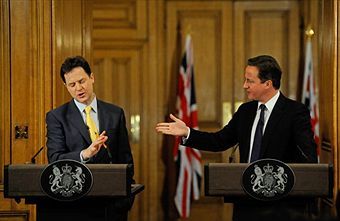 David Cameron’s piece on opening up public services today is, as Ben Brogan
notes, one of the most important moments of Cameron’s
premiership so far. First, it is, as I discussed last week (subscribers here), part of a concerted attempt to get the Big Society back to its original
meaning, that public services do not need to be provided by the state. As Cameron writes,
“our plans to devolve power from Whitehall, and to modernise public services, are more significant aspects of our Big Society agenda than the work we’re doing to boost social action.”
David Cameron’s piece on opening up public services today is, as Ben Brogan
notes, one of the most important moments of Cameron’s
premiership so far. First, it is, as I discussed last week (subscribers here), part of a concerted attempt to get the Big Society back to its original
meaning, that public services do not need to be provided by the state. As Cameron writes,
“our plans to devolve power from Whitehall, and to modernise public services, are more significant aspects of our Big Society agenda than the work we’re doing to boost social action.”
Next, the ideas in this piece are the central thread that runs through the public service reforms the coalition is pushing through. Cameron says that outside the security services and law and order, public services “should be open to diversity; open to everyone who gets and values the importance of our public service ethos.”
But there is a danger that these reforms will have nowhere near the impact that they should have. This will happen if profit-making companies are excluded from this process. Charities and social enterprises will only ever be able to provide a limited amount of competition to state run services.
Worryingly, Nick Clegg declared just 11 days ago that businesses would be barred from the right to challenge for local public services. As he said in his big public service reform speech, “we have designed a “Community Right to Challenge” to allow communities and charities to trigger a procurement exercise for local public services. But we will not extend that right to challenge to businesses.”
Without business involvement, there won’t be sufficient competition to radically drive up standards. If Cameron wants to be a great public service reformer, he is going to have to let businesses be involved. If he won’t, he’ll merely be tinkering around the edges.







Comments